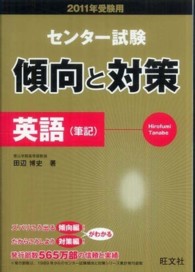- ホーム
- > 洋書
- > 英文書
- > Philosophy
Full Description
What does it mean to be human in modernity? This book examines being human, in its theoretical, practical, and productive aspects, not in abstraction from historical, social, and political settings, but rather as set in concrete historical and material circumstances. Through the analysis and close reading of a number of texts of the modern thinkers, which include those of Nietzsche, Dostoevsky, Tolstoy, Kracauer, Heidegger, Benjamin, Hans Jonas and Agnes Heller, it demonstrates that the complexity and variety of the human experience is grounded in the modern subjectivity, which establishes itself as universal, rational, autonomous, and necessary. Such a subjectivity is characterised as self-legislating or establishing the universal moral law and is further defined by historicity, or the interpretation of its actions as conditioned by the previous and current social and political circumstances. The book then shows that the multiple facets of modernity make the experience of being human fascinating, complicated and ultimately unique.
Contents
Foreword: close-ups and close-downs
1. On gods and demons
2. The other in the mirror
3. Conversation and critique
4. The burdens and blessings of boredom
5. The eternal return of the other
6. Establishing the laws of history
7. Names and voices in history
8. The comedy of philosophy
9. The gifts and dangers of free speech
10. The promise of the beautiful
11. Rethinking the ontological and scientific revolutions
12. Productive imagination








